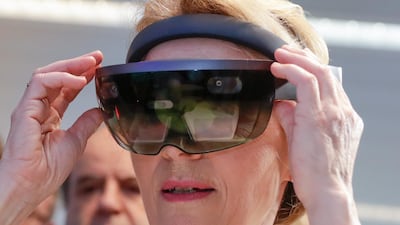Artificial intelligence is being used to solve five global challenges despite the technology being in its "infancy" and facing funding constraints, according to Mubadala's head technologist.
“We are truly living in special times” in terms of innovation, Rafic Makki said at a public forum on AI at Khalifa University in Abu Dhabi on Thursday.
He said the five challenges moving closer to being solved because of AI are: quantum computing; using lab-grown DNA to store digital memory; high-temperature fusion; targeted cancer treatment; and safe autonomous driving.
Mr Makki made his comments as Mubadala, the strategic investment arm of the Abu Dhabi government, is repositioning its portfolio to include more investments in technology, with a focus on life sciences and medicine, according to its group chief executive. "I'm all in when it comes to investing in the tech space but double click on med-tech and double click on life sciences, an incredibly exciting area," Khaldoon Al Mubarak said earlier this month.
Mr Makki said society is at the very beginning of harnessing AI's potential and understanding how it can be applied to solve the world's most pressing challenges.
He also said "we are closing in on a third AI winter", referencing two previous times in the 1970s and 1990s, when enthusiasm for the promising technology waned after a decade of major progress.
“The hype exceeds what can be done, funding stops and [researchers and academia] can no longer innovate any more,” he said, calling for a paradigm shift in sustaining AI research.
The potential upsides could be massive.
By 2040, global data storage demand will outpace the supply of silicon – the material used to make microchips – by as much as 100 times, according to a 2016 paper published in Nature that proposed using DNA to store memory. Last year, Boston start-up Catalogue packed all 16 gigabytes of Wikipedia on to strands of DNA.
Mr Makki called it “the best storage medium known to humankind” (honed over billions of years of evolution) and that machine learning – a type of AI – can help predict and optimise the amount of space data takes up.
Another global challenge is generating carbon-free power and nuclear fusion to achieve this has been eluding scientists for decades. While the 100 million °C needed for fusion to occur is doable, sustaining it for more than a minute, or in a way that produces more energy than it takes for nuclear reaction, has not been done. AI algorithms that help study weather patterns can be used in the context of fusion, too, Mr Makki said, and that can help model the dynamics at play and make the process of fusion more efficient.
All that said, Mr Makki ended with the statement: "Machines are nowhere near what our brain can do. Not even close."


